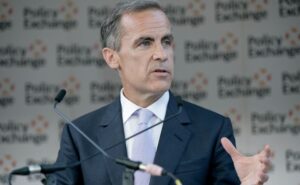The industry-led, UN-convened Net-Zero Banking Alliance has announced a new collaboration with the Centre for Climate-Aligned Finance. The collaboration is designed to harmonize, develop, and implement climate alignment methodologies for financial institutions, focused on sectoral decarbonization.
The Center and the Alliance have a shared ambition for excellence in the pursuit of common goals and are building complimentary work programs to facilitate capacity building within banks through collaborative development and promotion of robust methodological approaches to alignment, the identification of gaps, and the overcoming of barriers.
The Net-Zero Banking Alliance, which is championed by former Bank of Canada governor, Mark Carney, brings together banks worldwide, representing over 25 per cent of global banking assets, which are taking a leadership role on climate change. Signatories have committed to align their lending and investment portfolios with net-zero emissions by 2050, consistent with limiting global warming to 1.5°C from pre-industrial levels.

Mark Carney, former Bank of Canada governor and global economist.
Carney said in a statement that the financial systems needs to transform to ensure a “prosperous and just transition to net-zero” and that by joining the alliance, Canadian banks are “bringing their deep expertise and strong balance sheets to drive solutions for the sustainable economy.”
Combining near-term action with accountability, this ambitious commitment sees banks setting an intermediate target for 2030 or sooner, using robust, science-based guidelines, taking into account the findings of the Intergovernmental Panel on Climate Change (IPCC) based on no/low overshoot scenarios. The Alliance reinforces, accelerates and supports the implementation of decarbonization strategies, providing an internationally coherent framework and guidelines in which to operate, supported by peer-learning from pioneering banks. It is the banking pillar of the Glasgow Financial Alliance for Net Zero and is grounded in the UN Race to Zero.
The Center for Climate-Aligned Finance was established by RMI to help the financial sector transition the global economy toward a zero-carbon, 1.5°C future. With deep partnerships in finance, industry, government, and civil society, the Center works to develop decarbonization agreements within high-emitting sectors, build global frameworks for climate alignment, and support financial institutions in decarbonizing their lending and investing portfolios. Launched in 2020, the Center builds on RMI’s nearly 40 years of experience developing market-based solutions to accelerate the energy transition.
Less than two weeks away from COP26, the UN-Convened Net Zero Asset Owner Alliance launches its inaugural, biennial Progress Report, highlighting that 29 of its member investors have committed to reducing portfolio emissions by 25-30% by 2025 across three asset classes. This range is higher than the targets set by the inaugural Target Setting Protocol, published in January (-16 to -29% by 2025).
Only asset owners that commit to achieving net-zero portfolios by 2050, and that establish intermediate targets every five years in line with the Paris Agreement’s goal of limiting warming to 1.5°C, can participate in the Alliance. This represents a rapid growth in asset owners leading by example, and not asking of real economy companies what they aren’t already asking of themselves.








